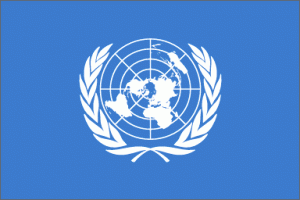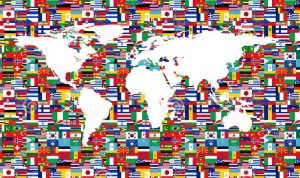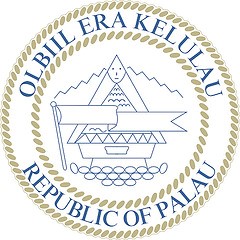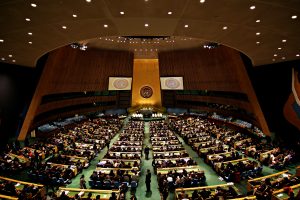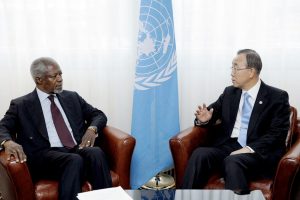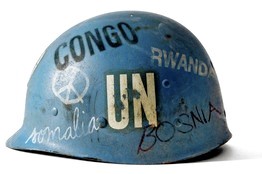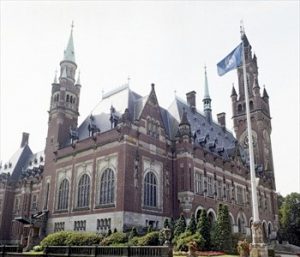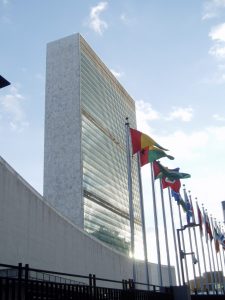Classic / International Court of Justice, League of Nations, Mohamed Ogbi, UN’s General Assembly, UN’s Trusteeship Council, United Nations / May 24, 2018
From the “League of Nations” to the “United Nations”
From the “League of Nations” to the “United Nations”
After World War I,
In years 1919 and 1920 all countries that had participated in the massacre of the 1st World War reunited for the Peace Conference of Paris, on the 25th of January 1919, the conference formally accepts the suggestion of U.S. president Woodrow Wilson that consisted in forming a supranational organization with the main goal of world peace safeguarding.
A commission composed by representatives of each adhering country guided by President Woodrow Wilson, was assigned to draw up the organizations statute, which was signed by 44 countries during the Versailles Treaty on the 28th of June 1919 in the Hall of Mirrors of Versailles Palace.
This organization was named “The League of Nations” and its headquarters where located in Geneva in the “Building of Nations”; it’s major activities where creating infrastructures for areas such as international postal mail and aviation, but most of all solving territorial disputes between countries that had fought on opposite sides during WWI, using solely the art of diplomatic negotiation. The League of Nations accomplished most missions until the beginning of the thirties when it failed to act against the 1931 Japanese Invasion of Manchuria, the 1935 Second Italo-Ethiopian War, the 1937 Japanese invasion of China, and the German expansions under Adolf Hitler that irreversibly ignited the escalation that brought society to World War II.
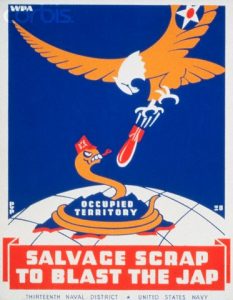
Poster for Thirteenth Naval District, United States Navy, showing a snake representing Japan being bombed by an eagle
After World War II,
After the devastation of WWII, it was evident to every member country that “The League of Nations” experience had failed, but the fear that the next war could be fought with nuclear bombs played an important role in convincing world leaders that a new, more globally comprehensive, and powerful super national organisation was needed.
The big first step towards the formation of a new supranational entity was made by U.S.A. President Franklin Delano Roosevelt, together with U.K. Prime Minister Winston Churchill with the stipulation of the “Atlantic Charter”, which took place on the 14th of August 1941 on the battleship “HMS Prince of Wales”.
On the 25th of April 1945, the Conference on International Organization was held in San Francisco, California, with government representatives attending from 51 different countries, who contributed in drafting the “Charter of the United Nations”.
The result from the development of the “League of Nations”
On the 24th of October 1945 the “United Nations” officially came into existence upon the ratification of the charter by the permanent members of the UN’s Security Council (USA, UK, France, the Republic of China and the Soviet Union), and the majority of the other 46 signatory countries. The UN’s first General Assembly meeting was held in London in January 1946, where Manhattan, New York City was selected as the site for the UN’s headquarters; the building was completed in 1952 and it’s designated has international territory like other UN facilities
What is this United Nations business all about?!
The United Nations, in the preamble to its Charter, set an objective to “establish conditions under which justice and respect for the obligations arising from treaties and other sources of international law can be maintained”, this statement is important because one of the UN’s primary objectives is to develop, promote and apply international law.
Nowadays the UN has been able to reach the unbelievable number of 193 member states and regulates a wide range of issues of international concern such as lasting world peace, human rights, disarmament, international crime, refugees, migration, nationality problems, the treatment of prisoners, the law of the sea, the use of force, the conduct of war, the environment, sustainable development, international waters, outer space, global communication and world trade.
The UN organization has 5 main organs: the General assembly, the Security Council, the International Court of Justice, the Economic and Social Council, the Secretariat and the sixth organ, the Trusteeship Council (which is inactive since the independence of Palau).
The United Nations’s General Assembly,
It’s composed by representatives of every member state; it’s the place where each country can express its opinions regarding any international matter with the certainty that most countries of the world will be listening.
Each member state appoints a diplomatic that represents the country during G.A. meetings (which are usually held during the period that goes from September to the first half of December) and has the right to 1 vote, regardless of its dimensions or richness.
The General Assembly’s resolutions brought to important agreements and to the creation of international law policies; these resolutions are nothing more than simple recommendations since they cannot be imposed on member states in a binding way, however, they have a high level of authority as they represent the belief of the majority of the member states.
When the G.A. votes on the more delicate matters, a two-third’s majority of voters is required, for example, in questions like peace recommendations, member expulsion or budgetary matters; all other questions are decided by majority vote.
The G.A. may make recommendations on any matter within the scope of the UN, except matters of peace and security that are under the consideration of the UN’s Security Council.
The UN’s Secretariat,
It’s an organ headed by the Secretary-General, assisted by an international team that is selected directly by the Secretary-General, which is appointed by the General Assembly. The UN’s charter provides that the team must be chosen by application of the “highest standards of efficiency, competence, and integrity”, it also provides that the staff shall not seek or receive instructions from any authority other than the UN.
The Secretary-General is, according to the UN charter, the organization’s “chief administrative officer” but he effectively is also a diplomat and world mediator; he can bring to the Security Council’s attention “any matter which in his opinion may threaten the maintenance of international peace and security”; the Secretary-General currently is Mr Ban Ki-moon, who took over from Kofi Annan in 2007 and has been elected for a second term that will conclude at the end of 2016.
The UN’s Security Council,
It’s main objective is to maintain peace between states, its composed a board of 15 states, 5 of which are permanent members (USA, UK, France, Russia and China), the other 10 members are elected by the General Assembly according to their geographical representation, for a mandate which lasts 2 years, (Argentina, Australia, Azerbaijan, Guatemala, Luxembourg, Morocco, Pakistan, the Republic of Korea, Rwanda, and Togo).
Each S.C. member has the right to 1 vote; when voting for the S.C. initiatives 1 negative vote is enough to block it, even if each other S.C. member votes positively.
According to the UN statute, all decisions made within the Security Council are binding for each member state; while all other UN bodies, like the General Assembly, are limited to make suggestions to member states, the UN’s S.C. has the power to take decisions that governments of each member state are obliged to apply.
The International Court of Justice,
It’s composed by 15 judges who are elected by the General Assembly according to their qualification and not nationality, though two judges of the same country cannot be elected at the same time.
The I.C.J. is located in The Hague, in the Netherlands; member states can appeal to the I.C.J. for solving frictions regarding, borders, fishing, mining, and other matters related to the UN’s statute.
Both the General Assembly and the Security Council can request the I.C.J.’s advisory opinion on any subject
The UN’s Economic and Social Council,
It’s composed by 54 members with a three years mandate, the E.S.C., takes place once every year for one month.
It’s main objectives are to examine, discuss issues and advise the General Assembly regarding matters like, economic development, environmental issues, human rights, and other economic matters; it also coordinates the work of especially agencies such as FAO (concerning food and agriculture), OIL (concerning occupation), OMS (concerning health care) and UNESCO (concerning education, science and culture).
The UN’s Trusteeship Council,
Its objective was to control the state of the trusteeship territories, these where ex colonies that were given this status, in order to guarantee that the states responsible for these territories where promoting their evolution towards self-determination.
The last of the UN’s 11 Trusteeships was Palau, in Micronesia that became independent in November 1994 and became the last UN member state, since then the council’s activities where quit.






